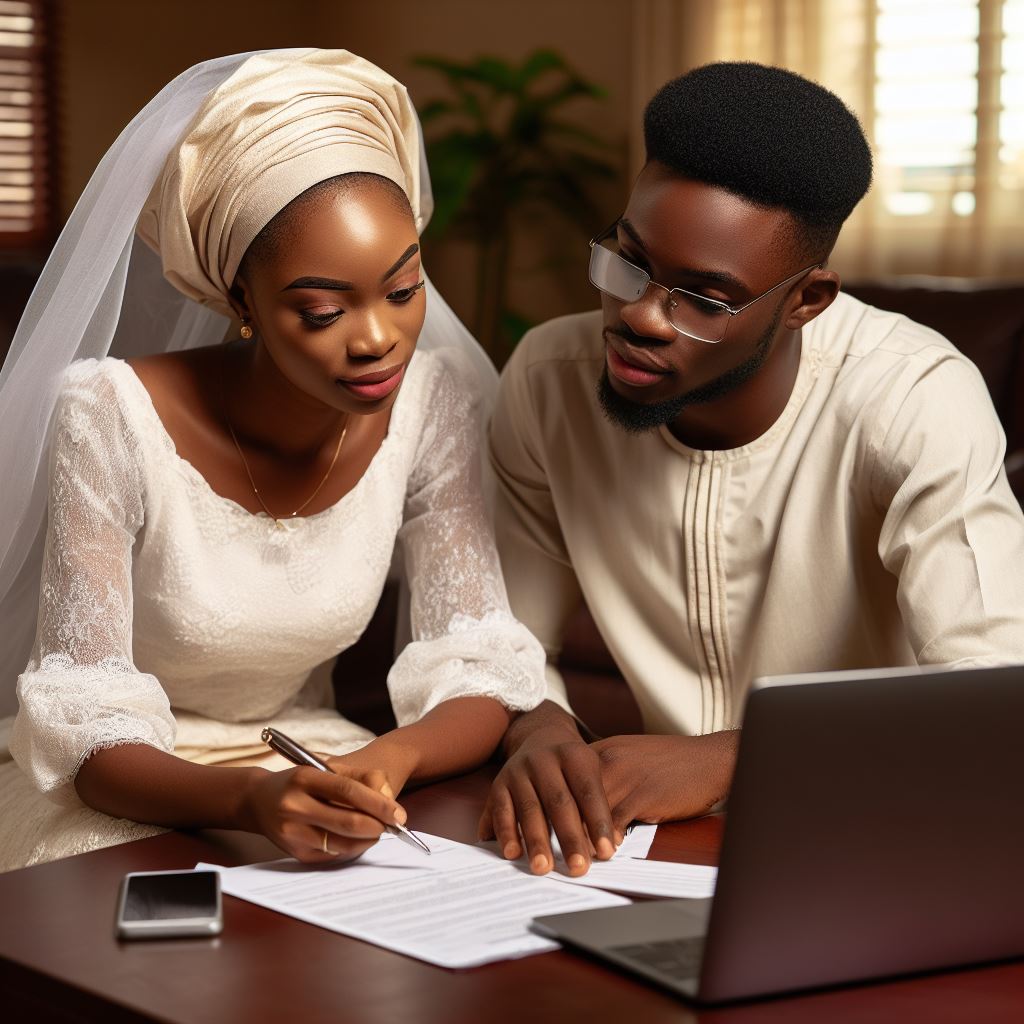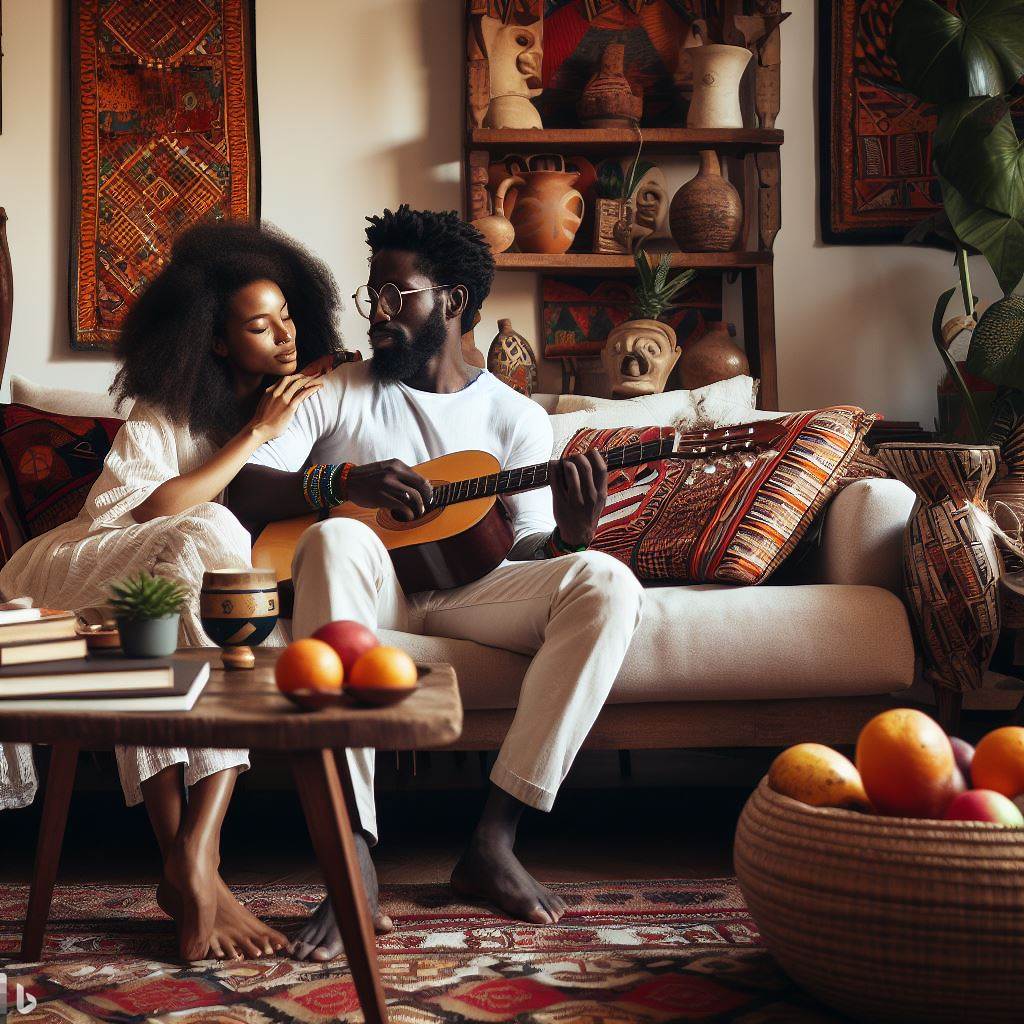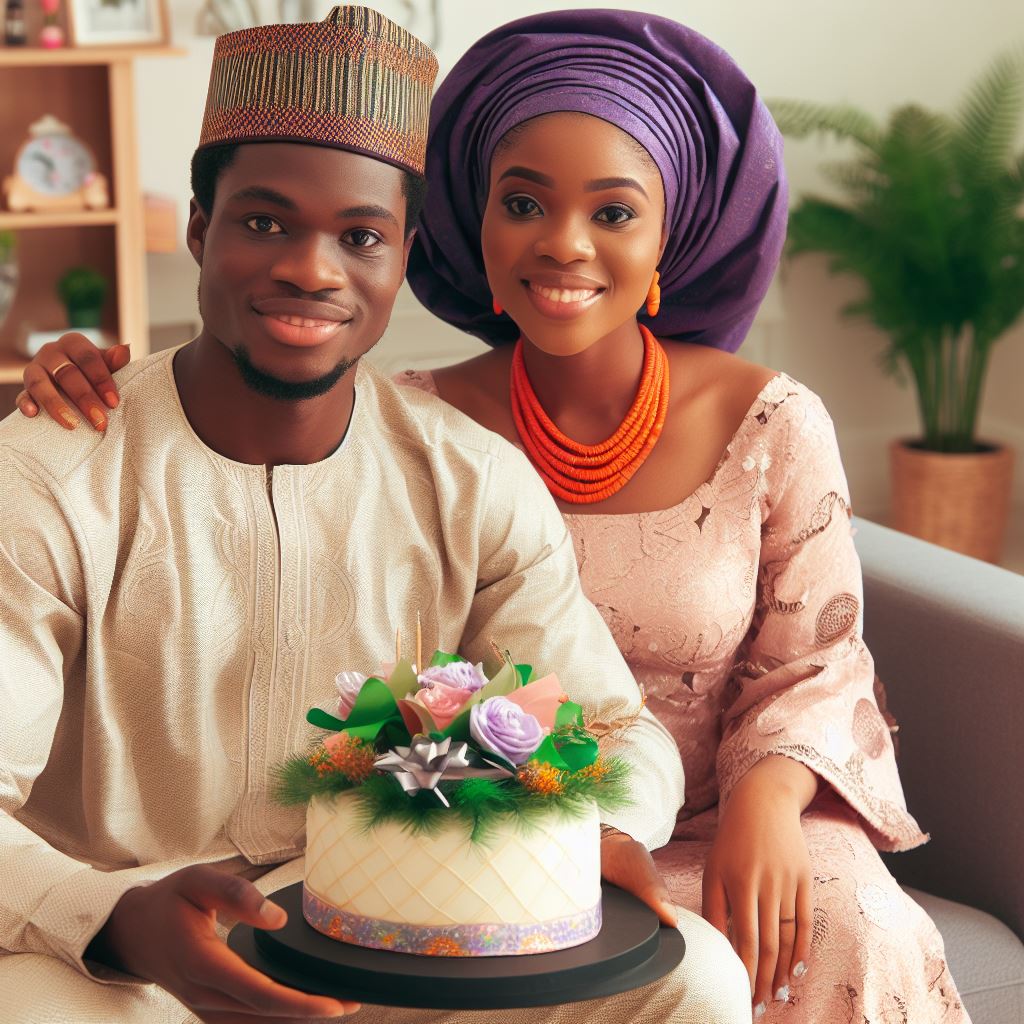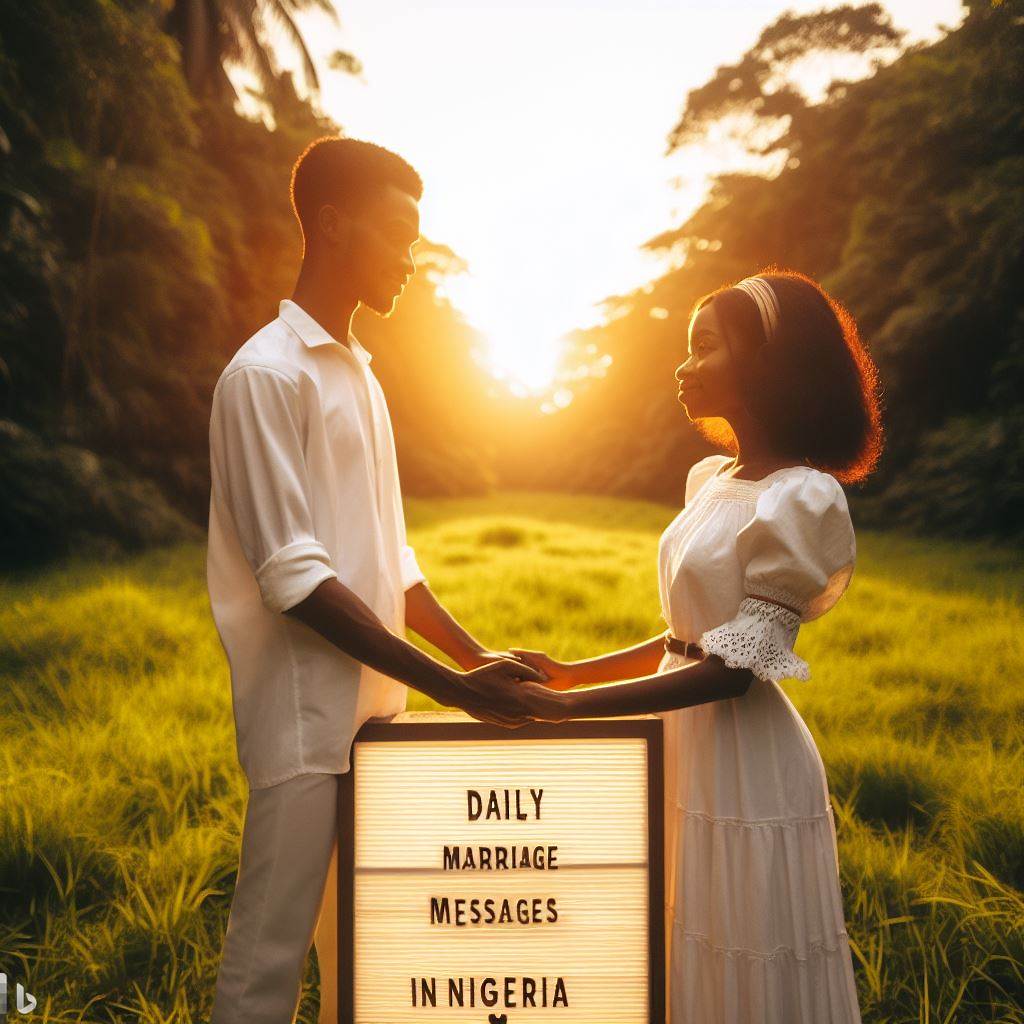Introduction
Brief overview of Nigerian marriage contracts
Nigerian marriage contracts are legally binding agreements that govern the rights and responsibilities of spouses in marital unions.
Importance of cultural influences on marriage contracts
- Nigerian marriage contracts are deeply rooted in the country’s diverse cultural heritage.
- These contracts reflect the unique customs, traditions, and beliefs of different ethnic groups.
- They vary in terms of ceremonies, dowries, and marital obligations, showcasing the rich cultural tapestry of Nigeria.
- Understanding these cultural influences is vital for comprehending the significance and nuances of Nigerian marriage contracts.
- Cultural aspects like religion, ethnicity, and regional customs shape the terms and conditions of these contracts.
- This section explores how cultural elements impact the formation, interpretation, and enforcement of marriage contracts in Nigeria.
- By delving into these influences, we gain insights into the multifaceted nature of Nigerian marital relationships.
- The intricate interplay of tradition and law makes Nigerian marriage contracts a fascinating subject of study.
- Let’s embark on a journey to explore how culture weaves through the fabric of Nigerian matrimonial agreements.
Traditional Nigerian Marriage Practices
Description of traditional marriage ceremonies in Nigeria
Traditional marriage ceremonies in Nigeria are vibrant and elaborate affairs, filled with rich cultural symbolism and customs.
The ceremonies vary across different ethnic groups, but they generally involve a series of rituals that signify the union of two families.
Some common elements of Nigerian traditional weddings include the exchange of gifts, payment of dowry, traditional attire, music, dancing, and feasting.
Traditional wedding ceremonies often take place in the bride’s family home or village and are witnessed by family members and close friends.
Role of families and extended relatives in marriage contracts
In Nigerian culture, marriage is not just a union between two individuals but also between their families.
The families play a crucial role in the negotiation and formation of marriage contracts.
The parents of the bride and groom, as well as extended relatives, act as intermediaries in the marriage negotiations.
They discuss the terms of the marriage contract, including dowry payment, bride price, and other customary obligations.
The involvement of families and extended relatives ensures that the union is recognized and supported by the larger community.
Influence of cultural norms and customs on marriage agreements
Cultural norms and customs heavily influence marriage agreements in Nigeria.
For example, polygamy is still practiced in some Nigerian communities, and it may be reflected in marriage contracts.
Religious beliefs also influence marriage agreements, with some couples incorporating Islamic or Christian customs into their ceremonies.
Traditional rites and rituals are upheld to honor ancestral traditions and maintain cultural identity.
Marriage agreements in Nigeria are not only legal contracts but also a way to preserve cultural heritage and maintain social cohesion.
Read: The Journey from Wedding Day to Years of Unity in Nigeria
Influence of Religion on Marriage Contracts
Islam and Marriage Contracts in Nigeria
Islamic traditions profoundly shape marriage contracts in Nigeria, reflecting the cultural fabric of the nation. Islamic marriage ceremonies and requirements include:
- Nikah Ceremony: Islamic marriages, known as Nikah, involve a contract where terms are mutually agreed upon.
- Dowry and Mehr: The groom pays a dowry and provides a mehr (bride’s gift), which are essential elements.
Sharia Law and Its Impact on Marriage Contracts
- Legal Framework: Sharia law governs aspects of family life, influencing marriage contract regulations.
- Polygamy: Sharia allows polygamy, impacting clauses related to multiple spouses in marriage agreements.
Christianity and Marriage Contracts in Nigeria
Christianity, another dominant religion, adds unique dimensions to marriage contracts in Nigeria.
Christian wedding ceremonies and rituals encompass:
- Church Weddings: Christian marriages often occur within the church, involving religious rites and blessings.
- Vows and Commitments: Couples exchange vows, reflecting Christian doctrines and mutual obligations.
Religious Doctrines and Their Impact on Marriage Agreements
- Monogamy Principle: Christianity advocates monogamous unions, shaping clauses around faithfulness and fidelity.
- Marital Responsibilities: Christian doctrines emphasize mutual respect, impacting the roles defined in marriage contracts.
In Nigerian society, the influence of Islam and Christianity on marriage contracts underscores the intricate interplay between cultural traditions, religious beliefs, and legal frameworks.
Understanding these nuances is essential for appreciating the rich diversity within Nigerian matrimonial practices.
Read: Understanding the Deep Meaning of Marriage Messages
Tribal Diversity and Marriage Contracts
Overview of Nigeria’s major tribes and their marriage customs
- The Yoruba tribe, known for their elaborate wedding ceremonies, values the consent of both families.
- The Igbo tribe places importance on the bride’s family providing a dowry to the groom’s family.
- The Hausa tribe believes in arranged marriages and gives a bride price as a sign of respect.
- The Ibibio tribe focuses on preserving their cultural heritage through traditional marriage ceremonies.
Varied approaches to dowry and bride price across different tribes
- In the Yoruba tribe, the dowry known as “Igba Nkwu” is given by the groom’s family to the bride’s family.
- The Igbo tribe follows the tradition of the groom’s family providing a bride price called “Ime Ego.”
- The Hausa tribe practices the “Sadaki” system, where the groom presents gifts and money to the bride’s family.
- The Ibibio tribe uses the “Akpè Achè” system, where the groom’s family provides gifts and money to the bride’s family.
Tribal traditions and their influence on marriage contract terms
- The Yoruba tribe emphasizes the importance of mutual consent and ensures both families agree on the terms of the marriage contract.
- The Igbo tribe’s marriage contract terms are influenced by the payment and acceptance of the bride price.
- The Hausa tribe’s marriage contract includes the agreed upon Sadaki amount and other terms set by both families.
- The Ibibio tribe’s marriage contract includes the exchange of gifts and money as a symbol of unity and acceptance.
In fact, Nigeria’s tribal diversity greatly influences the marriage contracts across different regions.
From the elaborate wedding ceremonies of the Yoruba tribe to the arranged marriages of the Hausa tribe, each tribe has its unique customs and practices.
Understanding the historic significance and the cultural context of these tribes is crucial when examining marriage contract terms.
The varying approaches to dowry and bride price highlight the importance placed on economic and social aspects of marriage.
By acknowledging and respecting these tribal traditions, Nigerian society can better appreciate the diversity and richness of its cultural heritage.
Marriage contract terms reflect the values and customs of each tribe, ensuring the preservation of their unique identity.
Ultimately, tribal influences on marriage contracts in Nigeria demonstrate the power of tradition and cultural norms in shaping matrimonial agreements.
Read: Traditional Nigerian Wedding Messages and Meanings
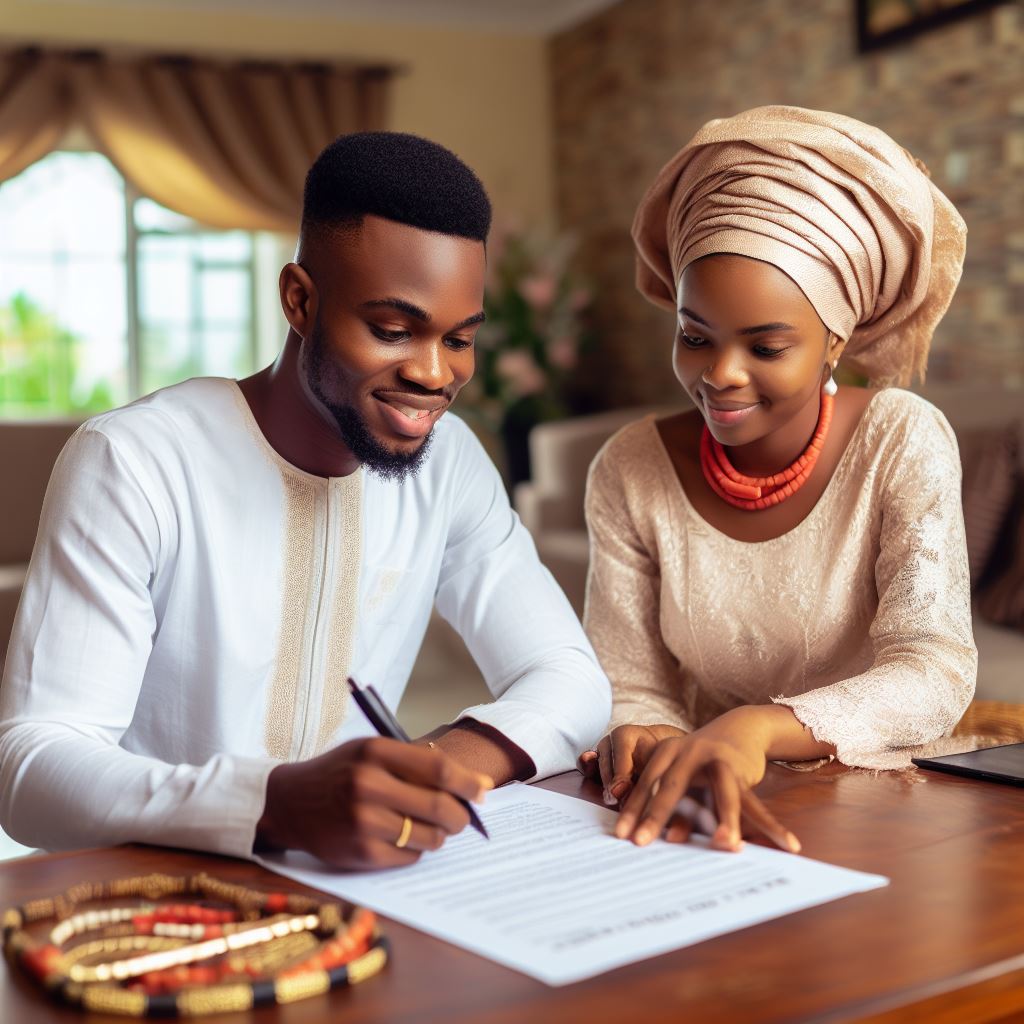
Legal Framework for Nigerian Marriage Contracts
In Nigeria, the legal framework for marriage contracts is influenced by cultural practices and beliefs.
This section examines the legal recognition of customary marriages, the provisions of the Marriage Act, and the need to balance customary practices with legal obligations.
Recognition of Customary Marriages by Nigerian Law
Nigerian law recognizes customary marriages as valid and binding.
Customary marriages are those conducted according to the customs and traditions of the ethnic groups in Nigeria.
These marriages are considered legal and enjoy the full protection of the law.
Customary marriages are recognized in Nigeria under the Marriage Act of 1990.
This act stipulates that any marriage conducted in accordance with the customs and traditions of the parties involved is recognized as a valid marriage.
The act acknowledges the importance of cultural diversity and respects the customs of various ethnic groups in Nigeria.
The Marriage Act and its Provisions for Registered Marriages
The Marriage Act also provides for the registration of marriages in Nigeria.
Registered marriages, whether conducted under customary or other forms, have legal recognition and protection.
The act requires couples to register their marriages within a specified period to ensure legal validity.
Registration of marriages provides benefits and protections to couples, including inheritance rights, spousal support, and property sharing.
It also ensures that the rights and obligations of both parties are legally enforceable.
The Marriage Act aims to safeguard the interests of couples and promote stability in marital relationships.
Balancing Customary Practices with Legal Obligations in Marriage Contracts
While Nigerian law recognizes customary marriages, it also imposes certain legal obligations on couples.
These obligations might conflict with some customary practices or beliefs.
Balancing these customs with legal responsibilities is crucial for ensuring fairness and justice in marriage contracts.
For instance, customary practices that discriminate against women regarding inheritance or property rights can clash with the principle of gender equality enshrined in the Nigerian Constitution.
Courts often play a crucial role in mediating such conflicts, striking a balance between cultural traditions and constitutional protections.
Legal obligations such as mutual respect, fidelity, and support between spouses are universally applicable and must be upheld in all marriage contracts, irrespective of cultural practices.
Nigerian courts interpret and apply the law to ensure that customs that violate fundamental rights or discriminate against any party involved are not legally enforceable.
In essence, Nigeria’s legal framework for marriage contracts recognizes the significance of cultural practices while upholding legal obligations.
The recognition of customary marriages, provisions for registered marriages, and the need to balance customs with legal responsibilities ensure fairness and protect the rights and interests of couples.
It is through this harmonious balance that Nigeria’s diverse culture and legal system coexist to support successful marital relationships.
Read: The Symbolism Behind Nigerian Marriage Rings Explained
Changing Trends and Contemporary Influences
Western influence and its impact on Nigerian marriage contracts
- Introduction to Western influence on Nigerian marriage contracts
- Influence of Western concepts of love and romance on marriage agreements
- Adoption of Western wedding ceremonies and traditions in Nigerian marriages
- Shift towards more egalitarian gender roles influenced by Western values
- Rise of prenuptial agreements influenced by Western ideas of property rights
Urbanization and its effect on cultural practices related to marriage
- Urbanization and its impact on traditional marriage customs in Nigeria
- Increased exposure to diverse cultures and lifestyles in urban areas
- Emergence of new marriage practices influenced by urbanization and Westernization
- Shift from arranged marriages to love marriages in urban settings
- Changing expectations and demands of urban Nigerian couples on marriage contracts
The role of modern education and globalization in shaping marriage agreements
- Influence of modern education on Nigerian views of marriage
- Increased awareness of individual rights and gender equality through education
- Globalization and its impact on Nigerian marriage contracts
- Incorporation of international standards and practices into marriage agreements
- Influence of social media and online platforms in shaping marriage expectations and negotiations
In general, the changing trends and contemporary influences on Nigerian marriage contracts have significantly altered cultural practices.
Western influence has introduced new concepts of love, romance, and property rights, while urbanization has brought about a shift in traditional customs.
Modern education and globalization have also played a role in shaping marriage agreements, emphasizing individual rights and incorporating international practices.
These factors highlight the evolving nature of Nigerian marriage contracts in response to cultural shifts and external influences.
Conclusion
Recap of Cultural Influences on Nigerian Marriage Contracts
In this section, we delved into the captivating world of Nigerian marriage contracts, exploring the rich tapestry of cultures that shape them.
We’ve uncovered the profound impact of traditions, religion, and regional diversity on these unions.
Acknowledgment of the Complexity and Diversity of Nigerian Society
Nigeria’s societal mosaic is complex and diverse, reflecting the country’s numerous ethnic groups.
Each culture brings its unique customs and beliefs to the table, creating a mesmerizing blend of traditions.
Importance of Preserving Cultural Heritage While Adapting to Societal Changes
As Nigeria journeys through the 21st century, it’s vital to preserve the essence of these cultural marriage contracts while adapting to the evolving social landscape.
The delicate balance between heritage and progress is a testament to the resilience of Nigeria’s people.
In this ever-changing world, Nigeria’s marriage contracts stand as a bridge between the past and the future, a reminder of the enduring power of tradition and the vibrant tapestry of Nigerian society.

